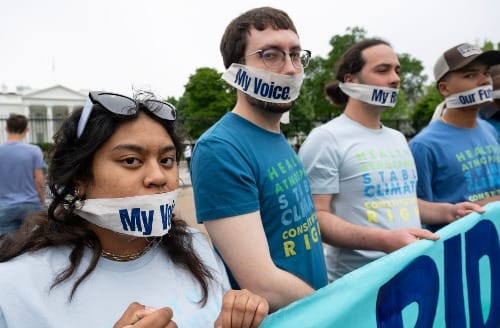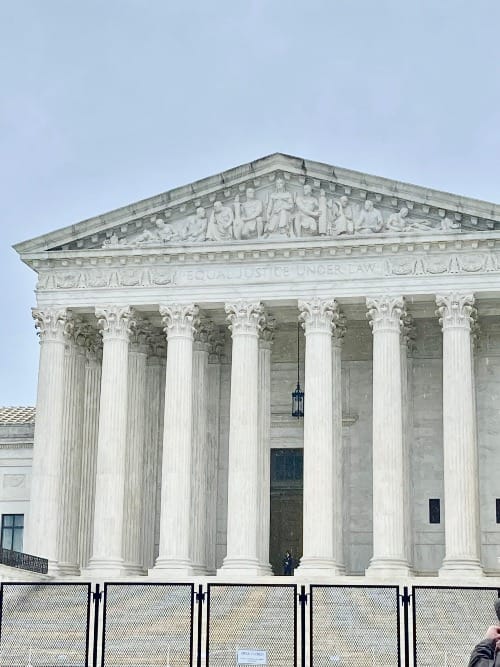Youth Suing US Government Over Climate Turn To The Supreme Court – Why Some Legal Experts Are Worried

Petition aims to reverse decision terminating landmark lawsuit. Plus, why another climate case pending before the nation’s highest court could be “game over” for US climate law.
In a move that some climate law experts have cautioned against, the 21 young people suing the United States government in the landmark constitutional climate lawsuit Juliana et al. v. US have turned to the US Supreme Court in an attempt to revive their case in what has been a nearly decade-long procedural legal fight. The move follows a decision from a federal appeals court panel in May that granted the government’s request to terminate the case before trial through an extraordinary and rarely used legal tool called a writ of mandamus.
On September 12, lawyers for the Juliana youth plaintiffs filed their own petition for a writ of mandamus to the US Supreme Court, seeking to reverse what they say is an “egregious error” by the three-judge panel of the Ninth Circuit Court of Appeals. The panel’s decision to grant the government’s mandamus petition – its seventh such petition filed overall throughout the course of this litigation – undermines the rule of law and upsets the fair process of federal civil procedure, the plaintiffs’ Supreme Court petition argues.
“Our petition to the Supreme Court is essential to correct this overreach by the Ninth Circuit and uphold the rule of law,” Julia Olson, chief legal counsel and co-executive director of Our Children’s Trust – the nonprofit law firm representing the youth plaintiffs – said in a statement.
While this is the plaintiffs’ first petition for a writ of mandamus, the government defendants represented by the US Department of Justice (DOJ) have repeatedly filed these petitions in relentless efforts to block the case from going to trial. Those previous petitions, including two to the US Supreme Court and four to the Ninth Circuit, were all denied. No other case in US history, according to Our Children’s Trust, has seen this level of obstruction with seven mandamus petitions aiming to evade trial.
The Juliana case, initially filed in 2015, alleges that the federal government’s promotion and perpetuation of a fossil fuel-based energy system, which significantly contributes to the worsening climate crisis, violates young people’s fundamental rights under the US Constitution. The lawsuit is part of a burgeoning wave of youth-led legal challenges to government policies over climate around the world, and while courts in other countries have started hearing and deciding these cases on the merits, US courts have been reluctant to take them up. Other constitutional climate cases filed by Our Children’s Trust at the state level in the US have mostly been unsuccessful, with the exception of cases filed in Montana and Hawai’i that recently won a groundbreaking judgment after trial and reached a historic settlement agreement, respectively.
The trial court judge in Juliana, US District Judge Ann Aiken, had been receptive to the plaintiffs’ novel constitutional challenge and had greenlighted the case for trial multiple times. Last year she allowed plaintiffs’ lawyers to file a narrower, revised version of their case after a Ninth Circuit panel ruled in a divided 2-1 decision in January 2020 that the case should be dismissed on redressability grounds. The panel determined that courts cannot order sweeping injunctive relief in the form of requiring the government to devise a “climate recovery plan” and overhaul the entire energy system. The panel majority also expressed skepticism that a court declaration of rights violations could provide sufficient relief, a point on which Aiken disagreed when she reactivated the case last year, noting that the panel’s decision did not explicitly preclude amending the complaint. The amended version of the case seeks only a court declaration.
The DOJ, now under the Biden administration, then continued to try to block the case from reaching trial. A different three-judge Ninth Circuit panel, all appointed by former President Trump, granted DOJ’s seventh mandamus request in May, ordering Aiken to dismiss the case.
The youths’ petition to the Supreme Court aims to reverse that decision.
“Today, I’m asking the Supreme Court to correct the Ninth Circuit’s abuse of the rules meant to protect our ability as young citizens to bring cases against our government,” plaintiff Avery McRae said in a September 12 press release. This case is about addressing the climate crisis and protecting our fundamental rights like our right to life and freedom. However, it is also about ensuring access to justice.”

In addition to filing a mandamus petition, plaintiffs’ lawyers filed a request to the Supreme Court for extension of time – until December 9, 2024 – to file a cert petition, in case their mandamus request is denied. They also reached out to the Biden administration about engaging in meaningful settlement talks and delivered petitions signed by nearly 350,000 individuals calling on the DOJ to end its relentless opposition to Juliana.
Legal experts say it is unlikely that the plaintiffs’ mandamus request will succeed.
“Even though I love the irony of the Juliana plaintiffs turning the tables on the government with their own writ of mandamus, and despite some good procedural arguments, I think [the Supreme Court] is likely to deny it,” Patrick Parenteau, professor of law emeritus and senior fellow for climate policy at Vermont Law and Graduate School, told Climate in the Courts.
Though requesting a writ of mandamus may be a long shot, turning to the Supreme Court with a cert petition, Parenteau and other climate law experts have warned, could be a potentially dangerous move. These experts worry it could result in a serious setback for climate law, saying it provides an opportunity for the conservative justices on the Court to revisit and even reverse the 2007 Supreme Court decision in Massachusetts v. US EPA. That divided 5-4 decision, considered a landmark court win for climate action, determined that the Environmental Protection Agency has an obligation to regulate greenhouse gas emissions under the federal Clean Air Act.
In a February 2021 Legal Planet blog piece, UC Davis environmental law professor Richard Frank wrote that taking Juliana to the Supreme Court would be “unwise,” arguing that “seeking Supreme Court review in Juliana would appear to be a major strategic error, with potentially profound, adverse consequences.”
Parenteau concurred with this view, telling Climate in the Courts that the move “has no upside and a dangerous downside.”
“There is zero chance of a favorable outcome,” Parenteau said. “The [cert] petition would be an open invitation to the hard right majority on the Court to revisit and overrule the standing decision in Mass v. EPA.”
But James May, a law professor at Washburn University School of Law, said he sees it differently than some of his colleagues.
“Juliana is unlike any other case,” he told Climate in the Courts. He explained that he doesn’t think there is anything to lose by seeking Supreme Court review. “There are things to gain, like recognition of a right to a stable climate, recognition of public trust responsibilities. Even in a dissenting opinion.”
A Potential “Death Knell” for State Law on Climate?
May pointed to another US climate case currently pending before the Supreme Court as one that he warned could have potentially much greater and far-reaching consequences – the climate deception lawsuit brought by the Hawaiian capital of Honolulu against major oil and gas companies. That case is before the Court on cert petitions from oil companies Sunoco and Shell that seek to quash Honolulu’s case and others like it before they get to trial, with the companies arguing that federal law preempts all state law on the matter of climate change. Should the Supreme Court take up the companies’ petitions and rule in their favor, May said it would be the “death knell” for addressing climate change through state law.
“That’s it. It would be the biggest climate case in US history,” he said. “The issue is whether state law can reach climate at all, not just in Hawaii, and not only with state common law,” he explained. If the oil companies prevail in their Supreme Court petitions, May warned there would essentially be “no place left to litigate or legislate climate in America.”
Parenteau agreed with May that if the Supreme Court takes up the oil company petitions it “would be a very worrisome thing” and potentially “could be game over.”
As for the Juliana plaintiffs, Parenteau said they were unfairly denied justice through the courts, and this appears to be the end of the road.
“This case could have and should have gone to trial years ago,” he told Climate in the Courts. “The government under three successive administrations has used the extraordinary writ of mandamus to deny plaintiffs the opportunity to present evidence on how government actions have put them in grave danger and deliberately compromised their future. Their constitutional claim of a fundamental right to a climate system capable of supporting human life on Earth, while novel and bold, was not frivolous and deserved an answer on the merits even if the ultimate decision went against them.”
“But,” he said, “it's time to move on.”


